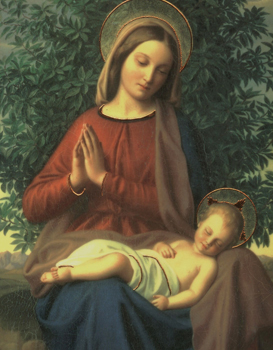
When asked about her training methods during an interview, an Olympic marathoner recently said "I don't believe in sacrifices, I believe in choices." I've been thinking about this ever since. I understand the difference she's referring to in regards to athletic goals, but what is the difference between sacrifice and choice in life outside of the "bird's nest?"
Here's what I've got so far: I think choice is about following your own destiny - decisions either take you closer to your destiny or further away from it. Sacrifice, on the other hand, concerns the destiny of others - the obvious example of this is Jesus Christ freeing all of us to pursue destiny by sacrificing Himself. All sacrifices must be choices though; we have to freely cooperate with God's grace because He will never force us to love Him. Sacrifice always involves faith in a God who has decided to bring about the salvation of the world through us. We make sacrificial choices that put others before ourselves and we trust that in giving us the grace to make this sacrifice, God is bringing us closer to our destiny as well - along with the rest of creation.
This is why community is so very important. It constantly reminds us that we all share one common destiny - the God who lovingly created us for union with Himself - and we cannot get there on our own because that common Goal draws us together. Community also provides endless opportunities for sacrifice. Since we become children of God by being bound to Christ in baptism, we live out our destiny as heirs of the kingdom in union with Him through our sacrifices. This is something I've come to understand much better through my kidney problems. I wanted so badly to suffer bravely when the pain was really difficult. I trusted that God could do something beautiful with my suffering, but until recently I didn't understand how this all happens. I think I'm starting to get it now - kinda. Christ doesn't need my help to save the world - He allows me to share in his work because in doing so He makes me into the person the Father created me to be. No one can reach their destiny without sacrificing his/herself, and sacrifice must be done for others.
I'll probably be thinking about sacrifice and choice for a long time, so if you have anything to add I'd love to hear your thoughts. Looking back over what I've just written, it all seems very elementary to me - stuff I already knew. But through my experiences, I'm beginning to connect and understand these ideas on a deeper level.








3 comments:
Hi Sara! During Lent I looked up as many references to sacrifice that I could find in Fr. Giussani's work and used them as a jumping off point for my Lenten meditations. I posted them on my blog ("The Meaning of Sacrifice" is the title of the post), but I'm also going to copy them here -- to save you the search (though, on my blog I was able to include the links to the full articles each quote is excerpted from, so if you want to read further, you can find everything there):
The sign of a life that goes forward in love for Christ, that is, that adheres to and participates in his companionship, is gladness. "I have told you these things so that my joy may be in you and your joy might be complete." Christ said this a few hours before he died.
Joy alone is the mother of sacrifice, because sacrifice is not reasonable if it is not attracted by the beauty of the truth. It is beauty—"the splendor of the truth"—which calls us to sacrifice.
- from How a Movement Is Born
Notes from a talk by Msgr Giussani at the international meeting of Communion and Liberation leaders in August 1989.
One of the actions promoted by GS as early as 1958 was charity in the area of the "Bassa milanese". Every week, several hundred students went from Milan to its outskirts, called the "Bassa," where the living conditions of many families were close to the poverty line and social life was practically non-existent. One afternoon a week, the students stayed there playing with the children and organizing, in accord with the local parish priests, periods of reading instruction and catechism. They also tried to help the families meet their needs.
"Life must be total sharing," explains Fr Giussani, "but disattention, fear, love of comfort, obstacles in the environment, malice, all empty life of the value of charity. To create a mentality of charity, the most humble and effective way is to begin to live some remnant of free time expressly, purposely as a sharing in the life of others. Commitment involving physical sacrifice, moreover, is essential for it to influence our mentality."
The charitable proposal thus was and is the educative tool for bringing about this "conversion."
- from Culture:
a test of experience, political action, ecumenism on the CL website
1. Be deeply rooted in love for the Kingdom of God, which happens not because of what you do, but through the offering of sacrifice. It is only the Cross that saves he world.
2. May this make you calm and joyful in whatever task you are assigned. ...So, even if you work doesn't go as you had dreamed, accept it happily; feel the kingdom of God, Brazil and the destiny of GS much more in never being discouraged, in adapting yourselves to everything, than in any other ability.
3. Just as you have to be faithful to our community and to the values and the directives given for your spiritual life and for educating your persons, so for the activity and behaviour with others and the environment the rule is a deep adaptation: Do not have any pretensions and don't pass a negative judgement on anything.
Be in love with the Lord who has chosen you to begin something that could be very fruitful for his Kingdom: and don't worry about anything except being there, obedient and willing.
Gratiam agimus propter magnam gloriam tuam (We give you thanks for your great glory).
And you, too, are a hem of that glory, not what you manage to do, but you yourselves, your offering.
- from Fr Giussani's letters to the first four students of Gioventù Studentesca (Young Student) who left for Brazil. It was 1962.
1. I have to tell you that you are making possible a great thing and a great dream.
2. It is a sacrifice precisely because it is something great. And the sacrifice is the adaptation and the obedience. Jesus began to save the world by depending on Mary and Joseph, who certainly did not have the ideas of the kingdom of God that Jesus and his divine Father had.
3. The balance in keeping faithful to our values must be first of all interior, and in what you do, before being a matter of what you expect of the others. Here go carefully, and don't…
Just be, and for the moment don't preach too much. This is only a practice-run. You have not gone there to change Brazil. You have gone there in order to begin a service. Have deep understanding and forbearance with the others.
- - from Fr Giussani's letters to the first four students of Gioventù Studentesca (Young Student) who left for Brazil. It was 1962.
The "newness" brought about by the Holy Spirit through the Incarnation can be described as the forgiveness of sins; the Incarnate Son is the Redeemer of Man, and the Invisible Father revealed through the Incarnate Son is the "Father of mercies." Human insufficiency before the vocation to divine life (the religious sense) is further augmented by the poison of sin that has taken residence in the human heart. For Giussani, the human posture before the Mystery is thus that of the "blind beggar" before Christ. Spirituality is the cry for mercy. The gesture or act through which Christ restores reality to its original truth is "sacrifice," understood as a participation in the Cross. As a result of truth, fidelity to the truth about reality and the openness to Divine Trinitarian Life engraved in it always involve sacrifice. That is why there cannot be spirituality without asceticism, as Louis Bouyer insisted. This asceticism is thus not a denial of the goodness of creation and the world but the affirmation that the distortions brought about by sin are not the ultimate truth of the world. So powerful is the redeeming sacrifice of Christ that Giussani can say that what sin has brought about "doesn't exist," that the only reality is Christ, who is, through sacrifice, all in all. Awareness of this reality allowed Peter to declare his love for Jesus in spite of having betrayed him. This yes of Peter is paradigmatic for Christian spirituality in the thought of Giussani. Indeed, the sacrifice that makes it possible ensures that the "passion for humanity" that is characteristic of the Christian is not obscured or destroyed by sin. As such, this kind of asceticism is the greatest contribution the Christian can make for the good of the world. It is the highest form of charity. Christian spirituality thus understood is a sacrificial love for the world, seeing and living our life in Christ as the Original and Ultimate Truth of all that exists, by the power of the Spirit, to the glory of the Father.
- Lorenzo Albacete, in A Generative Thought, page 45-47
Positivity of Life and Memory
Milan, June 10, 2001
I wanted first of all to greet you, asking of you the charity to offer something, some of your toil, also for me. But it is obvious that this happens in the face of the other duty, which is even more true than having a particular that is in some way interesting for one's own life. This other duty is that Christ has called us, and if we have said "Yes" to Him, we have said "Yes" to the meaning of the whole world. Imitating Christ means to imitate One who lived for love of the world.
In this sense we can and must say that our action–as a judgment on what happens or as sequela attempted by our frail will, out of the very trust God has made us experience with the decision to place ourselves in His sequela–our action (since the purpose of our every action is Christ) and any relationship we have must be tackled positively.
Positivity is the great law of those who have a reason for guidance or correction, but first and foremost, self-guidance and self-correction. To the extent that we live the memory of Christ, it becomes a door flung open, a window opened wide onto positivity.
And not least among the difficulties that we live is the fact of non-immediate peace of mind in all that we do, if this peace of mind is understood as generated by a feeling, dictated by temperament, lack of reflection, or presumptuousness.
On the contrary, positivity as the criterion of all that we do, this affirming everything starting from a positivity, normally–I say normally, at a certain point, at least for the times fixed by God–is a source of sacrifice, a source of pain; it is a rising up, a finding prepared before our eyes a future which, in its particulars, in any case, is hard. To grasp positivity in all that we do or see others doing, or that we know to be in the world, this positivity demands a great faith. A faith that is great—not faith as a wave welling up in our hearts, but faith in the most stringent or final sense of the word.
We shall return to these things; we shall certainly come back to these things we are saying today in the August Retreat, because this observation is fundamental. But in the meantime let's remember that, since what I have said about faith is true, the question is seen better–better than by making technical examinations or comments obtained by our strength, by the strength of our eyes–through memory: it is memory as it is lived that makes us find all that is an answer to what you have posited as a problem.
-- from Notes on Memory, by Father Giussani
Monsignor Giussani: The greatest joy and greatest sacrifice in leading a people is in asking God sincerely and continually -- hence the Spirit and the Virgin -- for light for one's intelligence and ardent fire for one's charity given all the problems that arise in the heart of every man in face of events that the mystery of God allows, problems that appear in the heart and work of each one, in the place where he finds himself.
- from A Founder Speaks about Communion and Liberation, in ZENIT
The nature of a people can be understood from its work, from the value it ascribes to that work. For the meaning of the world is affirmed or denied not so much through words but through the offering of one's daily work, through the sacrifice made for the work of Another. This happens with the commitment of each one in that piece of reality that the circumstances propose every day, to manipulate and transform it, asking always to be active co-workers with Christ, sharing with Him the will of the Father who is in heaven. Building cathedrals-of stone or of people-is the most thrilling task there is for a Christian, as the great T.S. Eliot asserts in the dramatic perspective that affirms the alternative between good and evil or violence: "And if the Temple is to be cast down, we must first build the Temple."
- Giussani, on the CL website
The absence of obligation, joy, and that cheerful heart Paul extolled among the Corinthians are not just exterior traits or a superficial mask of contentment: we can make a sacrifice that costs us so much effort that it makes us weep. However, unltimately it can be done with a certain spontaneity. It can be done willingly, in short, as if it were the ineliminable urge to express something we want to express, with passion, like the expression of something that is worth living, and therefore, manifesting.
-- Giussani, Why the Church, p 100
Neither the apostles nor Christian tradition imposed this communion, this sharing of things; however, it remains the natural expression of the reality of the faith. It is not other than this personal tension, this profound spontaneity which characterizes communion.
This is the opposite of moralism, of the sacrifice conceived and made in the name of a formal sense of duty. This is the gift of self to God, the gift as the true fruit of a person's adherence to the great fact based on the recognized state of communion: sharing the same reason for living.
-- Giussani, Why the Church, p 101
From this ontological value of the company springs its moral value: it is the fruit of freedom. Its root is Christ's presence, but in its acknowledgment and consent it is the fruit of our freedom.
This hint gives rise to the moral formula that most intensely summarizes and best points out the praxis of our life. "The greatest sacrifice is to give your life for an Other's work." This phrase is analogous to what Christ said: "No one loves his friends as much as someone who gives his life for his friends."3 But, even more deeply–as the whole of St. John's Gospel affirms–this phrase recalls Christ's own experience: He gives His life for the work of the Father.
- from The Greatest Sacrifice is to Give Your Life for Another's Work, Giussani
To give your life for an Other's work, if we are not to be abstract, means that everything we do, the whole of our life, is for the Movement. To say that what we do is done to give growth to the charism we have been given to share in is to say something that has a precise, historical reference point, its own chronology, its own physiognomy, something that can be described and even photographed; something that has names and surnames and, at the origin, one name and surname. If to give your life for an Other's work doesn't indicate a name and surname then its historicity vanishes, its concreteness crumbles, and you no longer give your life for an Other's work, but you give your life for an interpretation of your own, for what you like, for your own profit, or for your own point of view.
To give your life for an Other's work; this "other," historically, phenomenally, as it appears, is a particular person; in the case of our Movement, for example, I am the one. As I say this, it is as if all that I am were to disappear (because the "Other" is Christ in His Church). A historic point of reference remains–the whole flow of words, the whole torrent of work that was born from that first moment in the Berchet High School.4
To lose sight of this point is to lose the temporal foundation of our unity, of the usefulness of our actions; it is like making cracks in a foundation.
- from The Greatest Sacrifice is to Give Your Life for Another's Work, Giussani
Wow! There is a lot of really good stuff here. Thank you so much!
St. Paul uses atheletic training quite frequently to describe spiritual conditioning. It was the apostle himself who first used sports analogies in teaching the faith.
Post a Comment